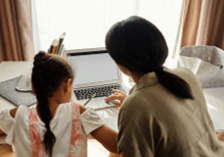Homeschooling Phenomenon Continues to Explode
Many news outlets, including Education Reporter, have chronicled the growth of homeschooling, and few deny that it has become a phenomenon since the start of the pandemic in 2020. The Washington Post recently released new data which shows that homeschooling has increased more than 50 percent since 2018, with 2.7 million students now learning at home, according to Parenting Mode.
The Post reports that it collected “reliable data from 32 states and the District of Columbia, representing more than 60 percent of the country’s school-age population.” The resulting analysis includes “school registration figures for nearly 7,000 individual school districts,” and is, The Post asserts, “the most detailed look to date at an unprecedented period of growth in American homeschooling.”
The data reveal that in some areas homeschooling has increased more than 100 percent since the 2017-2018 school year, including Washington, DC, where the number of homeschoolers has jumped 108 percent. In New York, the numbers have increased 103 percent; in South Dakota 94 percent; in Rhode Island 91 percent, and in California 78 percent. Overall, the total increase was 51 percent. (Examples cited are through the 2022-23 school year except for Rhode Island, where the most recent data available reflects the 2021-22 school year).
 In comparison, states that track private school enrollment showed only a 7 percent increase during the same time frame, and government enrollment dropped 4 percent, which is attributed primarily to the growth in homeschooling. In only Georgia and Maryland has homeschooling declined to its pre-pandemic levels, according to The Post, and in Florida, Louisiana, South Carolina, and South Dakota, homeschooling has continued to rise.
In comparison, states that track private school enrollment showed only a 7 percent increase during the same time frame, and government enrollment dropped 4 percent, which is attributed primarily to the growth in homeschooling. In only Georgia and Maryland has homeschooling declined to its pre-pandemic levels, according to The Post, and in Florida, Louisiana, South Carolina, and South Dakota, homeschooling has continued to rise.
The Post analysis found that during “the 2021-2022 academic year, the most recent for which district-level federal enrollment data are available, there was one homeschooled student for every ten public-school students” in nearly 400 districts, “roughly quadruple the number of districts that had rates that high in 2017-2018.” The Post opined that this signifies “a sea change in how many communities educate their children and an urgent challenge for a public education system that faced dwindling enrollment even before the pandemic.”
Statistics from Parenting Mode show that homeschoolers total 6.73 percent of all K-12 students in the United States. Parents who would like to homeschool say the chief reason they have not yet done so is socialization, followed by work schedules and time management conflicts. Homeschooling parents cite concerns about the safety of the school environment followed by poor academic quality as reasons for their decision.
Teachers’ unions fight homeschooling
The Post report admits homeschooling has become “a mainstay of the American education system,” but this admission hardly indicates a shift in the Left’s view of the phenomenon. The Post states that its research “found no correlation between school district quality, as measured by standardized test scores, and homeschooling growth,” despite claims that “the homeschooling boom is a result of failing public schools.” Phyllis Schlafly Eagles leader John Schlafly points out that “the school choice movement constantly calls attention to ‘failing schools’ and presents school choice as the answer. But the reality is otherwise: Few parents in ‘failing schools’ are interested in school choice, while most parents who do exercise choice are not in failing schools.”
The analysis also shows that access to higher performing school districts fails to dissuade some parents from homeschooling, and concedes that “many parents say home education empowers them to withdraw from schools that fail their children or to provide instruction that better reflects their personal values.” It is the latter that appears to be the driving force.
Predictably, liberals are fretting about the several million homeschooled children now learning outside the purview of the government schools, as well as the potential future impact of the homeschooling movement “on society” and the government school system.
Teachers’ unions, for example, have condemned homeschooling for decades in their writings and annual conferences. For many years, Phyllis Schlafly published the radical resolutions adopted by the National Education Association (NEA) at its annual “Representative Assembly,” in both her Phyllis Schlafly Report and Education Reporter.
its annual “Representative Assembly,” in both her Phyllis Schlafly Report and Education Reporter.
The NEA’s perennial resolution against homeschooling claims that such instruction “cannot provide the student with a comprehensive education experience” and calls for strict government control of homeschooling. It ends by stating that “home-schooled students should not participate in any extracurricular activities in the public schools.” Fortunately, these punitive recommendations have for the most part been ignored, and instead, state legislatures in recent years have tended to grant homeschoolers more freedom than in the past.
Ironically, American Federation of Teachers (AFT) President Randi Weingarten is taking at least some of the heat for the homeschooling boom. Weingarten has been especially vocal in attacking opponents of CRT and other radical leftist programs and curricula in government schools, and predictably insists that more funding for education would fix the current problems. But as Reason.com points out: “Weingarten has presided over four of the worst years for public schools in living memory. Since 2020, Republicans have closed the longstanding double-digit trust lead Democrats held in education, confidence in public schools has reached historically low levels, and schools are dealing with students who are behind, struggling, or even missing from school entirely after the longest widespread closings in modern times.”
An article in the New York Post called the homeschool boom “the clearest possible thumbs-down on the entire American educational establishment,” and put the blame squarely on the teachers’ unions. The article opined: “[Homeschooling’s] appeal spans every divide of politics, geography and demographics.... The NEA/AFT response is to push their media allies to churn out ‘news’ about the perils of homeschooling, and to finger right-wing extremists as driving the broader push for parental control.
But shouting ‘vast right-wing conspiracy’ doesn’t cut it.”
Parental control of homeschooling
A favorite charge of homeschooling opponents is that homeschooled children tend to be abused, neglected, or exposed to noxious political views, and The Washington Post report mentions this as well. But studies by the National Home Education Research Institute (NHERI.org) show that these students suffer abuse less often than students in traditional schools. In the same paragraph, The Post acknowledges that some homeschooled students “are taught using the classics of ancient Greece.”
Then comes the admission that pinpoints the crux of the matter for homeschooling opponents: “What all [homeschoolers] share is the near-absolute control their parents wield over the ideas they encounter.” But for most homeschooling parents, this is precisely the point — that they alone are responsible for the upbringing and education of their own children.
Many parents understandably wish to protect their children from the destructive pedagogy of the government schools, starting with the discredited “research” of the pedophile Alfred Kinsey, which forms the basis of the Comprehensive Sex Education (CSE) furnished by Planned Parenthood and SIECUS. They wish to protect their children from the bizarre teachings of Brazilian Marxist and “educator” Paolo Freire, which are incorporated into much of today’s curricula including Social Emotional Learning (SEL), and from CRT indoctrination, with its Maoist thought-reform tactics as promoted by the 1619 Project and other racially divisive curricula. (See Book Review, this issue.)
Homeschool academic achievements
Perhaps most laughable in The Post report is the following quote from so-called child advocate and Harvard Law School Professor Emeritus Elizabeth Bartholet, who said in regard to the numbers of students currently being homeschooled: “Policymakers should think, ‘Wow — this is a lot of kids. We should worry about whether they’re learning anything.’” Observers wonder if Bartholet is aware of the dismal National Assessment of Education Progress (NAEP) scores about which Reason.com recently commented: “Only 32 percent of fourth graders could read at a ‘proficient’ or higher level. Thirty-nine percent landed in the lowest score category ‘below basic.’ In math, 35 percent of fourth graders scored proficient or higher.”
Parenting Mode concedes that according to NHERI homeschooling success statistics, “78% of peer-reviewed studies on academic achievements show that homeschool students perform statistically significantly better than students in institutional schools.” This research incorporates data from various studies over more than two decades, including test-score data from the more rigorous Classic Learning Test (CLT). These studies support accumulated anecdotal evidence showing that homeschooled children consistently outperform their non-home educated peers.
But Bartholet is, after all, the same individual who called for a ban on homeschooling in 2020 citing alleged abuse. (See Education Reporter, Summer 2020.) The inconvenient truth for Bartholet and other critics is that for decades, many home-educated students have not only been high achievers but have matured into wildly successful adults, thus proving the lie of their detractors.
Interestingly, Parenting Mode also cites demographic data compiled by the National Center for Education Statistics (NCES) including that 83 percent of homeschooling households have two parents and that nearly half (48 percent) are homeschooling three or more children. For parents considering homeschooling, the annual average cost per child ranges from a low of $500 to about $2,500 on the high end, depending on where the family lives and the type of programs they use, according to Tutors.com (2023 Homeschooling Costs).
Want to be notified of new
Education Reporter content?
Your information will NOT be sold or shared and will ONLY be used to notify you of new content.
Click Here
Return to Home Page
